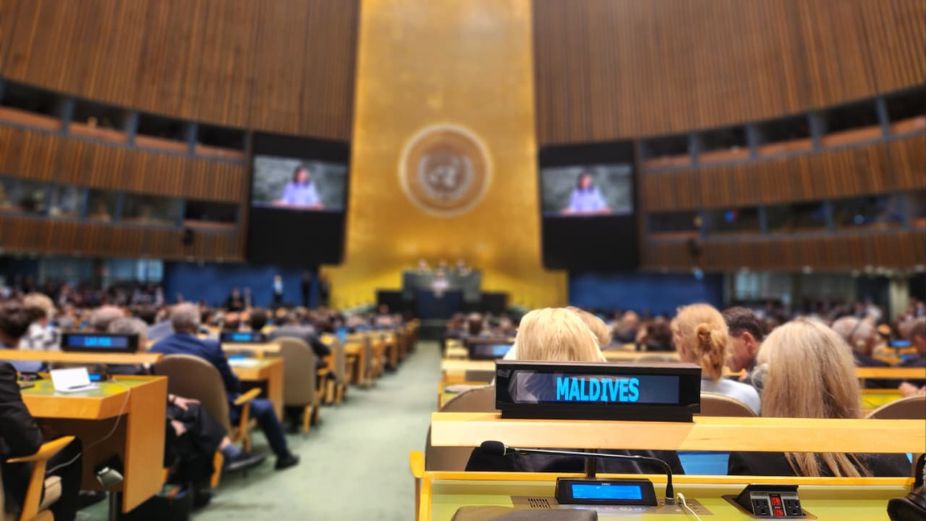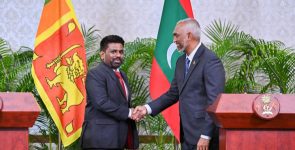
In September 1965, only weeks after independence, the Maldives took its first step onto the stage of world affairs by joining the United Nations. At the time, there were wider debates within the UN about whether very small states could shoulder the responsibilities of membership. The Maldives’ accession nevertheless went through smoothly, and its presence became part of that evolving conversation. It marked the beginning of an experiment: could the smallest of nations use the architecture of multilateralism not only to survive, but to shape global conversations?
Over the decades, the Maldives answered that question with an audacity that belied its scale. In 1989, the government convened the Small States Conference in Malé, a gathering that produced the Malé Declaration on Sea Level Rise. It was one of the earliest alarms about climate change, issued not by scientists in northern capitals but by islanders staring at the encroaching sea. That document is often credited with laying the groundwork for what would soon become the Alliance of Small Island States, a coalition that transformed vulnerability into leverage. It was a turning point: the Maldives had discovered that the UN was not merely a hall of speeches but a mechanism through which the fragile could bend the narrative of the strong.
There have been other milestones, each an assertion of presence. The country has served terms on the Human Rights Council, linking the moral language of human dignity to the physical survival of islands. In 2018, it made a bold but unsuccessful run for a seat on the Security Council, a reminder of the limits of arithmetic in regional blocs. In 2021, then-Foreign Minister Abdulla Shahid was elected President of the General Assembly, steering the seventy-sixth session with what he called a “Presidency of Hope.” For a year, a Maldivian diplomat presided over the world’s most universal forum, an unlikely but telling triumph.
As this year’s High-Level Week unfolds in New York, the Maldives arrives with both history and urgency. The agenda is crowded: the 80th anniversary of the UN, stock-taking on the Sustainable Development Goals, debates over financing and technology. For most leaders, these gatherings are rituals of visibility. For the Maldives, they are lifelines. The country’s diplomats are pushing for the operationalisation of the Multidimensional Vulnerability Index, a metric designed to account for climate and economic fragility rather than simple income levels. Without it, access to concessional finance is curtailed, leaving islands trapped by their own statistical “middle-income” labels. The fight over this index is technical, even bureaucratic, but for the Maldives it could mean the difference between building seawalls and surrendering islands to the tide.
There is also the wider SIDS blueprint, known as ABAS, the Antigua and Barbuda Agenda for SIDS, covering the next decade of resilience and development. For the Maldives, it is both a shield and a roadmap: a promise that the concerns of small islands are not afterthoughts but recognised pillars of the international system. Linking these commitments to bilateral pledges during UNGA week is where strategy becomes survival.
Beyond climate and finance, new debates are emerging that will also touch the Maldives. Artificial intelligence, once a distant abstraction, is now a matter of governance, integrity, and capacity. When the General Assembly discusses AI, the Maldives can argue that small states must not be left behind in shaping the rules that will govern elections, economies, and even disaster response. By presenting itself as a laboratory for ethical AI use in micro-jurisdictions, it can carve out relevance in a conversation otherwise dominated by giants.
This is the peculiar genius of Maldivian diplomacy: to inhabit multilateralism not as a theatre of grand gestures but as an arena where every procedural innovation, whether a vulnerability index, a declaration, or a council seat, becomes a brick in the seawall. In a chamber where the applause fades quickly and resolutions pile high, the Maldives has learned to convert symbols into leverage.
Even when its leaders are absent from the podium, the country’s presence in New York remains vital. For the Maldives, retreating into isolation is not an option. Its survival and prosperity depend on being heard in the world’s most crowded room, turning the vulnerabilities of small islands into a case for collective responsibility. From Malé in 1989 to Manhattan today, the smallest states have shown that they can shape the largest questions.











